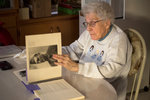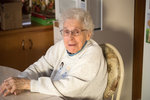

At 13 years old, Helen Holloway forged her baptismal record. She was still one year away from legally working, just before World War II.
“Actually, I made myself illegitimate,” said Holloway with a smirk. “My parents were married in October and I was born the following September — but I changed my birthday from 1925 to 1924 and my folks weren’t married then.”
Holloway, now 93, is a Rosie the Riveter — one of the women who worked in the factories during World War II to produce the nation’s war supplies. She was born in 1925 in Chicago. When she attempted to change the dates on her baptismal record, the Clorox turned the paper yellow.
“I was 13 years old,” Holloway said. “What did I know? So I went to the Board of Education, and I’m standing in line. When I get to the lady who was standing at the desk, she looked at all that and she looked at me and said, ‘You really want to go to work, don’t you?’ She could see that I lied about my age and everything.”
Despite Holloway’s illegitimate papers, the woman still approved her to begin working. During World War II, the U.S. had a worker shortage and the labor market changed drastically. With many of the nation’s men off at war, women filled in the gaps. Both Holloway and her mother worked during the war.
Although she began working at 13, her first job as a Rosie was test-firing army rifles when she was 17 years old.
During the war, Holloway held a myriad of jobs. When her contract for the job testing army rifles ended, she obtained another job by walking down the street the same day. “Help Wanted” signs were plentiful.
“I mean jobs went begging,” Holloway said. “I walked down the street and I saw a sign that said ‘help wanted,’ so I went upstairs and got hired. My job there was soldering the gear that you wore on your head when you were in a tank — because you had to talk on the radio to each other.”
Her job only lasted a few hours.
“A whistle blew,” Holloway said. “Somebody came on a loudspeaker and said ‘Everybody go down the steps and stand on the sidewalk. We’re going on strike.’ So I got my lunch, went down the steps and just kept going.”
Holloway’s next job — her third that day — was at Bendix Aviation and lasted for more than a few hours.
During her final year of high school, Holloway took a job nannying for one of her neighbors and her future husband’s family members. At 17, she fell in love.
Merle Foot, a Chicago native, came back to town on furlough from the army. Holloway knew many of his family members — his mother had been the librarian before she passed away and Holloway went to school with his younger brother. Foot was 10 years her senior.
“I hadn’t seen him since I was 13,” Holloway said. “... I knocked on the door and when the door opened up, here is this gorgeous, gorgeous soldier standing there. I looked at him and said ‘Hi, Merle, how are you?’ He didn’t answer me, and I was embarrassed. I said ‘You probably don’t remember me.’”
Foot did remember her, and the two saw each other every day while he was on leave.
“He was there for 30 days,” Holloway said. “... You have to understand that during the war, 30 days is a lot of days. So he was leaving this particular day. We didn’t talk about it beforehand, but he said ‘Would you run away with me?’ I looked at him and I said, ‘Run away? I have to finish high school!’ … I was an only child and getting married at 17 didn’t sound good. I said ‘Run away with you? What would we do?’”
Foot proposed, and suggested the two marry in Florida where his base was.
“I thought ‘oh yuck,’” Holloway said. “I had a great big bag of oats I was planning on sewing when I got my freedom, whatever day that was. I just couldn’t imagine being married at 17, because that’s a little bit too young.”
Holloway said she wouldn’t marry him yet, but she would wait for him. The two wrote to each other, except for a brief period. Holloway’s mother read one of the letters and didn’t want her 17-year-old daughter running away with a man 10 years her senior.
“I was just crazy about him,” Holloway said. “In 30 days, I fell madly in love.”
Holloway did wait for him, though, and in 1946 the two married on New Year’s Day in California. Holloway was 21, and they moved to Lewis County shortly after.
“I saw all these loggers,” said Holloway of her first impression of Lewis County. “That’s all there was to do in Lewis County at that time. They would be running around in a flannel shirt, and a pair of jeans, and then these crazy boots on. I thought they were nuts, because the snow was so deep.”
Holloway took a job at Kosmos Timber feeding lumbermen in the cook shack and Foot got a job at another lumber mill in Lewis County. The two were married for 15 years, before Foot passed away. They had two children together.
“When I stop and think about him and me, I don’t know how we each lived to get married,” Holloway said.
Holloway volunteered until she was 85, but “stopped working for wages” in 1969 after working at Boeing, on the very first 747.
“I was always wanting to be independent,” Holloway said.